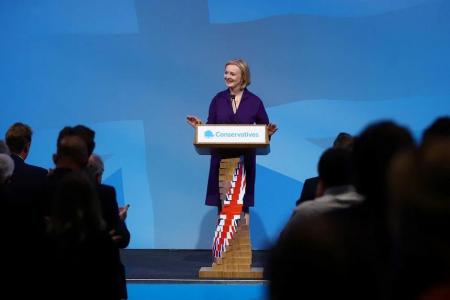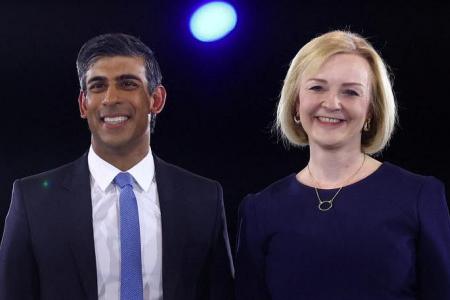Liz Truss is next UK prime minister after vote by Tory party members
LONDON - Liz Truss will be the United Kingdom's next prime minister after being voted in as leader of the governing Conservative Party by grassroots members on Monday.
Her election by an estimated 172,000 Tory party members was sparked by Prime Minister Boris Johnson's resignation in July.
She defeated her rival, Mr Rishi Sunak, a former finance minister.
Ms Truss, 47, will be the UK's third female prime minister after Mrs Margaret Thatcher (1979 to 1990) and Mrs Theresa May (2016to 2019).
Ms Truss and Mr Sunak, 42, have spent the last eight weeks rallying support among Conservative Party members who cast the final vote on Monday.
Mr Johnson resigned following a slew of scandals and resignations from his government.
Ms Truss garnered 81,326 votes (57.4 per cent), against Mr Sunak's 60,399 (42.6 per cent) of the eligible votes.
I am honoured to be elected Leader of the Conservative Party.
— Liz Truss (@trussliz) September 5, 2022
Thank you for putting your trust in me to lead and deliver for our great country.
I will take bold action to get all of us through these tough times, grow our economy, and unleash the United Kingdom’s potential. pic.twitter.com/xCGGTJzjqb
In a speech after winning the contest, Ms Truss said she will deliver a plan to lower taxes and boost economic growth.
“I will deliver a bold plan to cut taxes and grow our economy. I will deliver on the energy crisis, dealing with people’s energy bills, but also dealing with the long-term issues we have on energy supply,” she said.
Long the front runner in the race to replace Mr Johnson, Ms Truss will become the Conservatives’ fourth prime minister since a 2015 election.
Over that period the country has been buffeted from crisis to crisis, and now faces what is forecast to be a long recession triggered by sky-rocketing inflation which hit 10.1 per cent in July.
Ms Truss has promised to act quickly to tackle Britain’s cost of living crisis, saying that within a week she will come up with a plan to tackle rising energy bills and securing future fuel supplies.
Speaking in a TV interview on Sunday she declined to give details of the measures she says will reassure millions of people who fear they will be unable to pay their fuel bills as winter approaches. She declined to comment on a report that her energy plan could exceed 100 billion pounds (S$162 billion), but the lawmaker tipped to be her finance minister, business minister Kwasi Kwarteng, wrote on Monday that the government could afford to borrow more to fund support for households and businesses.
Truss has signalled during her leadership campaign she would challenge convention by scrapping tax increases and cutting other levies that some economists say would fuel inflation.
That, plus a pledge to review the remit of the Bank of England while protecting its independence, has prompted some investors to dump the pound and government bonds. The Institute for Fiscal Studies cast doubt last month on Britain’s next prime minister having room to make large, permanent tax cuts.
Ms Truss faces a long, costly and difficult to-do list, which opposition lawmakers say is the result of 12 years of poor Conservative government. Several have called for an early election – something Ms Truss has said she will not allow.
Ms Truss has said she will appoint a strong cabinet, dispensing with what one source close to her called a “presidential-style” of governing, and she will have to work hard to win over some lawmakers in her party who had backed Mr Sunak in the race.
The Institute for Government said Ms Truss would have a weaker starting point than any of her predecessors, because she was not the most popular choice among her party’s lawmakers.
First, she will turn to the urgent issue of surging energy prices. Average annual household utility bills are set to jump by 80 per cent in October to 3,549 pounds, before an expected rise to 6,000 pounds in 2023, decimating personal finances.
Britain has lagged other major European countries in its offer of support for consumer energy bills, which opposition lawmakers blame on a “zombie” government unable to act while the Conservatives ran their leadership contest.
In May, the government set out a 15-billion-pound support package to help households with energy bills as part of its 37-billion-pound cost-of-living support scheme.
Italy has budgeted over 52 billion euros (S$72.4 billion) so far this year to help its people. In France, increases in electricity bills are capped at 4 per cent and Germany said on Sunday it would spend at least 65 billion euros shielding consumers and businesses from rising inflation. - REUTERS
I have been proud to serve as leader of the Conservative Party for the last three years, winning the biggest majority for decades, getting Brexit done, overseeing the fastest vaccine rollout in Europe and giving vital support to Ukraine.
— Boris Johnson (@BorisJohnson) September 5, 2022
Get The New Paper on your phone with the free TNP app. Download from the Apple App Store or Google Play Store now



